第17章
V. The Lord therefore hath no less Dominion over a Servant that is not, then over one that is bound, for he hath a Supreme Power over both, and may say of his Servant no lesse then of another thing, whether animate, or inanimate, This is mine; whence it followes, that whatsoever the Servant had before his servitude, that afterwards becomes the Lords; and whatsoever he hath gotten, it was gotten for his Lord: for he that can by Right dispose of the Person of a man, may surely dispose of all those things which that Person could dispose of. There is therefore nothing which the Servant may retaine as his own against the will of his Lord; yet hath he, by his Lords distribution, a propriety, and Dominion over his own goods, insomuch as one Servant may keep, and defend them against the invasion of his fellow Servant, in the same manner as hath been shewed before, that a subject hath nothing properly his owne against the will of the Supreme Authority, but every subject hath a propriety against his fellow subject.
VI. Since therefore both the Servant himself, and all that belongs to him are his Lords, and by the Right of Nature every man may dispose of his owne in what manner he pleases; the Lord may either sell, lay to pledge, or by Testament conveigh the Dominion he hath over his Servant, according to his own will and pleasure.
VII. Farthermore, what hath before been demonstrated concerning subjects in an institutive Government, namely, that he who hath the Supreme Power can doe his subject no injury; is true also concerning Servants, because they have subjected their will to the will of the Lord; wherefore, whatsoever he doth, it is done with their wills, but no injury can be done to him that willeth it.
VIII. But if it happen that the Lord, either by captivity or voluntary subjection, doth become a Servant or Subject to another, that other shall not onely be Lord of him, but also of his Servants; Supreme Lord over these, immediate Lord over him.
Now because not the Servant only, but also all he hath are his Lords; therefore his Servants now belong to this man, neither can the mediate Lord dispose otherwise of them then shall seeme good to the Supreme. And therefore, if sometime in civill Governments, the Lord have an absolute power over his Servants, that's suppos'd to be deriv'd from the Right of Nature, and not constituted, but slightly pass'd over by the Civill Law.
IX. A servant is by the same manner freed from his servitude, that a Subject in an institutive government, is freed from his subjection; First, if his Lord enfranchize him, for the Right which the servant transferred to his Lord over himselfe, the same may the Lord restore to the servant again. And this manner of bestowing of liberty is called MANUMISSION; which is just as if a City should permit a Citizen to conveigh himselfe under the jurisdiction of some other City. Secondly, if the Lord cast off his servant from him, which in a City is banishment; neither differs it from Manumission in effect, but in manner onely: for there, liberty is granted as a favour, here, as a punishment: In both, the Dominion is renounced. Thirdly, if the servant be taken prisoner, the old servitude is abolished by the new; for as all other things, so servants also are acquired by warre, whom in equity the Lord must protect, if he will have them to be his.
Fourthly, the servant is freed for want of knowledge of a successour, the Lord dying (suppose) without any Testament, or Heire, for no man is understood to be obliged, unlesse he know to whom he is to perform the obligation. Lastly, the servant that is put in bonds, or by any other means deprived of his corporall liberty, is freed from that other obligation of contract, for there can be no contract where there is no trust, nor can that faith be broken which is not given. But the Lord who himselfe serves another, cannot so free his servants, but that they must still continue under the power of the supreme, for, as hath been shewed before, such servants are not his, but the supreme Lords.
X. We get a right over irrationall Creatures in the same manner, that we doe over the Persons of men, to wit, by force and naturall strength; for if in the state of nature it is lawfull for every one, by reason of that warre which is of all against all, to subdue, and also to kill men as oft as it shall seem to conduce unto their good, much more will the same be lawfull against Brutes; namely at their own discretion, to reduce those to servitude which by art may be tamed, and fitted for use, and to persecute and destroy the rest by a perpetuall warre, as dangerous and noxious. Our Dominion therefore over beasts, hath its originall from the right of nature, not from divine positive Right: for if such a Right had not been before the publishing of the sacred Scriptures, no man by right might have killed a beast for his food, but he to whom the divine pleasure was made manifest by holy Writ; a most hard condition for men indeed whom the beasts might devoure without injury, and yet they might not destroy them: Forasmuch therefore as it proceeds from the right of nature, that a beast may kill a man; it is also by the same Right, that a man may slay a beast.